Viewing the newsletter
The Fall 2017 SWAGS newsletter may be viewed as a PDF or as web-friendly text and pictures below. If you would like a printed copy of the newsletter, please email the SWAGS office.
The Fall 2017 SWAGS newsletter may be viewed as a PDF or as web-friendly text and pictures below. If you would like a printed copy of the newsletter, please email the SWAGS office.
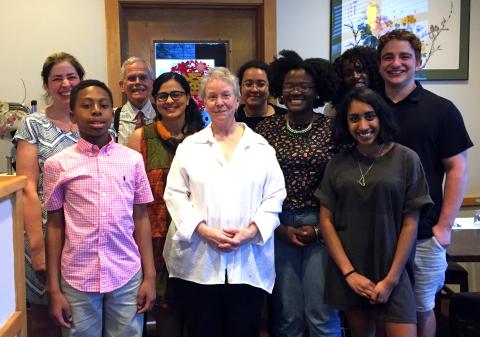
Congratulations to Krupa Shandilya for receiving tenure and Aneeka Henderson on her reappointment. Both will be on sabbatical for the 2017-2018 academic year.
Congratulations to Wendy Bergoffen on the renewal of her lectureship. Starting in July 2017, Wendy will move her lectureship entirely into the American Studies Department. Best of luck to her as she continues her work in Jewish Studies.
Sahar Sadjadi will be on leave for the Fall 2017 semester.
Michele Barale will be on sabbatical for the Spring 2018 semester.
Starting in Fall 2017, Rick Griffiths will move his appointment entirely into the Classics Department. He will be sorely missed.
Amrita Basu will be chairing the SWAGS Department in 2017-2018.
(Offered as SWAG 400 and POSC 407 [SC]) The topic will vary from year to year. A student may take this course more than once, providing only that the topic is not the same. In fall 2017 this seminar will explore the consequences of neoliberalism, cultural conservatism, Islamophobia, and anti-immigrant sentiments for women of different social and economic strata as well as women’s divergent political responses. Why have some women become prominent right wing leaders and activists while others have allied with leftist, anti-racist, and other progressive forces to fight for the rights of women and other marginalized groups? How have transnational forces influenced both forms of women’s activism? To what extent are there cross-national similarities in the impact of the far right surge on women, gender and sexuality? The seminar will draw on examples from many different regions of the world, with particular attention to India and the U.S. There will be a final research paper for this course. This course replaces SWAG 300 Ideas and Methods in the Study of Gender.
Taught by Professor Basu
“Queer Theory and Practice” is an interdisciplinary methods course designed to complement the existing SWAG core sequence. Using theories and approaches from the discipline of performance studies, the explicit mission of the seminar is to acquaint students with the study of LGBT history, politics, and culture while also strengthening student research skills in four overlapping areas: archival research, close-reading, performance analysis, and community engagement-as-activism. Course activities include working in the Amherst College Frost Archives, the production of a performance piece, and structured engagement with contemporary LGBT activism in the Pioneer Valley and the larger world.
Taught by Professor Polk
This course offers a cross-cultural study of gender transition and transgression. We will explore ethnographic studies of gender non-conforming lives in a variety of contexts around the world. Students will be encouraged to approach gender transition and gender non-conformity, and the role of the body in the production of sex and gender, through the synthesis of feminist, queer, and transgender theories. In addition to questions of appearance, body and identity, we will explore the social production of gendered roles, activities and relations across class, race, caste and religion. We will analyze the discursive and material conditions that have enabled the emergence of the category of “transgender” and its relation to other cultural categories of gender non-normative personhood. Finally, we will discuss the role of Western medical ideologies and technologies in shaping subjectivities as well as the convergence and divergence of medical diagnosis and identity. This seminar requires group student presentations during the semester and completion of an individual research project.
Taught by Professor Sadjadi
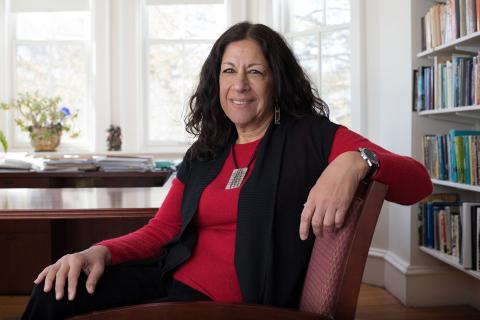
Amrita published a second edition of Women’s Movements in the Global Era: The Power of Local Feminisms. The anthology charts the trajectories of women’s movements, particularly since the UN’s 1995 women’s conference in Beijing. This edition contains six new chapters on individual countries and several major regions of the world, to illuminate both national and supra-national patterns. There are chapters on nine countries (Pakistan, China, India, South Africa, Palestine, Iran, Brazil, Russia, and the United States) and four major regions (Africa, Europe, Latin America, and the Maghreb, which comprises Morocco, Algeria, and Tunisia).
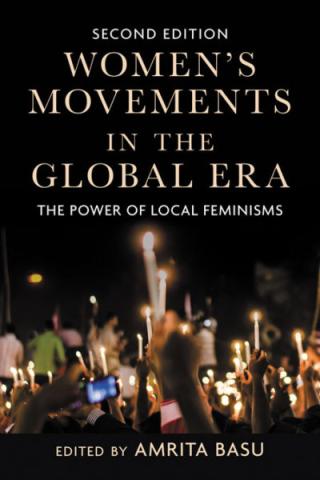
In the fall, Professor Polk was part of a screening & panel discussion on the documentary I Am Not Your Negro held at Lincoln Center in New York City. In January he presented at the 2017 Modern Language Association Conference in Philadelphia, on the panel Queering the Borders of the Black Freedom Struggle: Archives, Histories, Aesthetics. Then he traveled to Germany, where he was a visiting scholar at the JFK Institute of North American Studies at the Freie Universität Berlin. As part of the JFKI’s Research Colloquium, he lectured on his book project, Contagious Immunity: Race, Sexuality, and Black Military Workers Abroad, and participated in the “The Contemporary African Diaspora: Travelling Cultures in the New Black Atlantic” workshop held there in June.
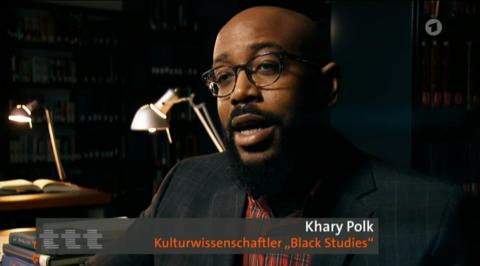
While working on his book manuscript, he appeared on the German television show “TTT” as a guest expert discussing race and masculinity in the film Moonlight, traveled to France to lecture at the CRESPPA (Centre de Recherches Sociologiques et Politiques de Paris) alongside Robert Reid-Pharr, and held a salon at the Village Berlin Community Center titled “After Moonlight: Intersections of Race and Sexuality in Berlin and Beyond.”
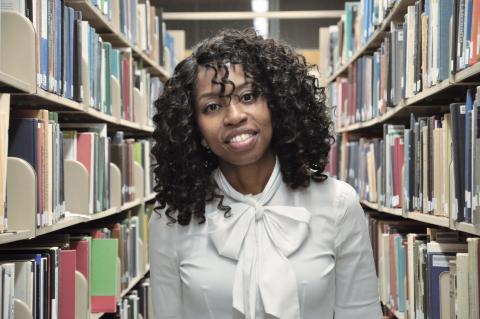
Earlier this year, Professor Henderson was awarded the Woodrow Wilson Career Enhancement Fellowship. Funded by the Andrew W. Mellon Foundation and administered by the Woodrow Wilson National Fellowship Foundation, the Career Enhancement Fellowship creates career development opportunities for selected faculty fellows with promising research projects. She is one of 30 junior faculty members across the nation selected for this prestigious honor.
Professor Henderson was also awarded the American Association of University Women or AAUW American Postdoctoral Research Leave Fellowship. Founded in 1881, the AAUW is the nation’s leading voice promoting equity and education for women and girls and the American Postdoctoral Fellowship is a prestigious and highly competitive national award. Congratulations!
In September 2016, Massachusetts Institute of Technology invited Professor Henderson to give a talk at its annual event series, “Feminisms Unbound”, a Consortium for Graduate Studies in Gender, Culture, Women, and Sexuality (GCWS) initiative featuring debates on feminist concerns, theories, and practices in the contemporary moment. In her invited talk, “Black Women and the Carceral State”, Henderson uncovered the intersections between state and intimate violence in late twentieth-century literary and visual texts.
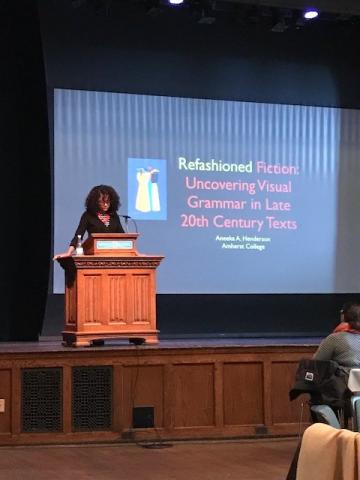
Professor Henderson gave another invited talk entitled “Refashioned Fiction: Uncovering Visual Grammar in Late Twentieth Century Texts” at the Fifth Exposure Symposium. Held at Mount Holyoke College in May 2017, Fifth Exposure features artists and scholars from across the United States, including keynote speaker, Jacqueline Goldsby, Professor of English and African American Studies at Yale University.
In April 2017, The Snyder Center for the Visual Arts at Marlboro College in Vermont invited Professor Henderson to give a presentation on race, art, and representation. In her invited talk, “Pain, Portability, and Provocation: Emmett Till at the 2017 Whitney Biennial”, Henderson contextualized Emmett Till’s historical legacy, critically examined Dana Schutz’s controversial painting of Emmett Till, and analyzed the various responses from scholars and critics about the representation of race and gender in visual texts.
Professor Henderson also gave several conference presentations including “You Can Never Go Home Again: On Racial Epistemologies of Belonging and Homelessness” at the 2016 American Studies Association (ASA) Annual Conference in Denver, Colorado. And in June 2016, Professor Henderson presented a talk entitled, “An Excavation: Mining the Archive of Black Lesbian Epistemologies” at Goldsmiths, University of London, U.K., for the Archives Matter Conference 2016: Queer, Feminist, and Decolonial Encounters.
Professor Henderson has accepted an invitation to be an Affiliate Scholar at Brown University’s Pembroke Center for Research and Teaching on Women for the 2017-2018 academic year. The Pembroke Center at Brown University is an interdisciplinary research center that fosters critical scholarship on questions of gender and difference, broadly defined, in national and transnational contexts. Scholars affiliated with the Center look to the complex ways “differences” are produced culturally, socially, epistemologically: sexual and gender differences, the differences that are fundamental to the categories of “race” and ethnicity, nationality, religion, and so forth. It is there, at the intersection of the production of knowledge and articulations of “difference,” that the Pembroke Center locates its research and teaching.
During her sabbatical in 2016-2017, Professor Sadjadi has been primarily working on her book about the clinical practices that have emerged around gender nonconforming and transgender children. She recently signed a book contract with the University of California Press. She has given lectures internationally, at Vanderbilt University in the US, Ambedkar University Delhi in India, and Iran Medical University Psychiatric Institute. In addition, she has been conducting preliminary research for her next project in Tehran. She will spend the last part of her sabbatical in residency at Brocher Foundation in Switzerland where she will write and research in conversation with other scholars who study the social and ethical implications of new medical developments.
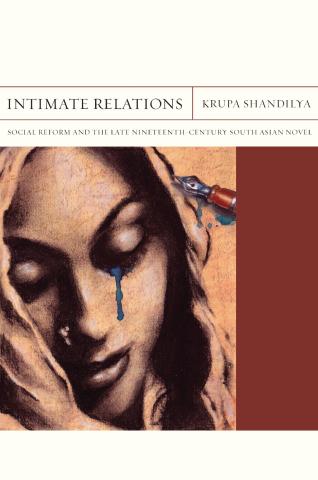
Professor Shandilya celebrated the release of her new book Intimate Relations: Social Reform and the Late Nineteenth-Century South Asian Novel.
The book remaps the discussion on gender and the nation in South Asia through a close study of the domestic novel as a literary genre and a tool for social reform. As a product of the intersection of literary and social reform movements, in the late nineteenth century the domestic novel became a site for literary innovation and also for rethinking women’s roles in society and politics. Professor Shandilya focuses primarily on social reform movements that negotiated the intimate relations between men and women in Hindu and Muslim society, namely, the widow remarriage act in Bengal (1856) and the education of women promoted by the Aligarh movement (1858–1900). Both movements were invested in recovering woman as a “respectable” subject for the Hindu and Muslim nation, where respectability connoted asexual spirituality. While most South Asian literary scholarship has focused on a normative Hindu woman, Intimate Relations couples discussion of the representation of the widow in bhadralok (upper-caste, middle-class) society with that of the courtesan of sharif (upper-class, Muslim, feudal) society in Bengali and Urdu novels from the 1880s to the 1920s. By drawing together their disparate histories in the context of contemporaneous social reform movements, Shandilya reflects on the similarities of Hindu and Islamic constructions of the gendered nation.
A book launch party was held at Amherst Books to promote the new books by Professor Shandilya and Professor Ingrid Nelson of the English Department.
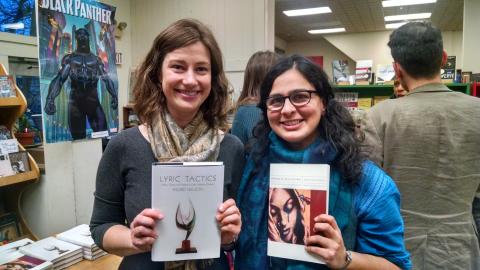
We had an excellent turn out at the 2016 SWAGS Fall Reception. Students, faculty, and colleagues came together in the SWAGS common room for food, community, and a raffle.
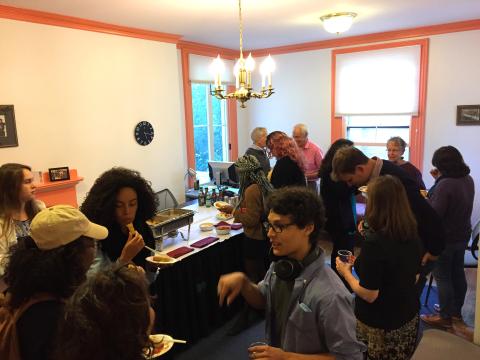
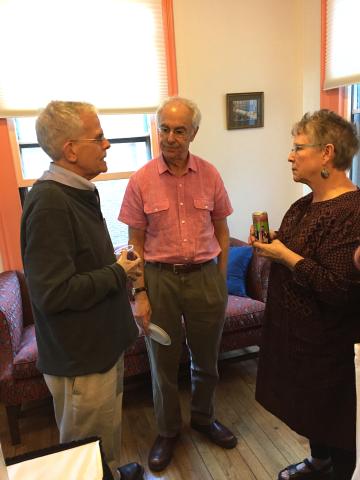
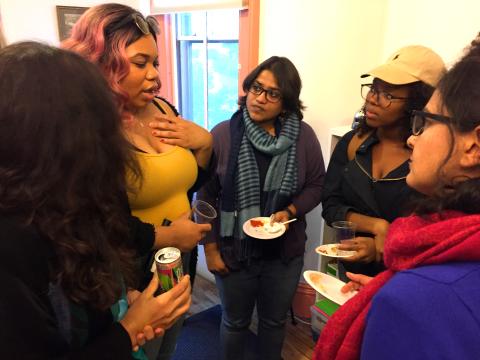
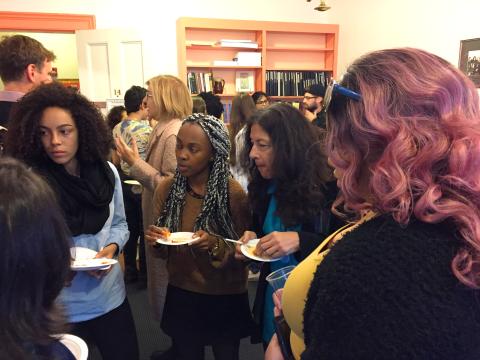

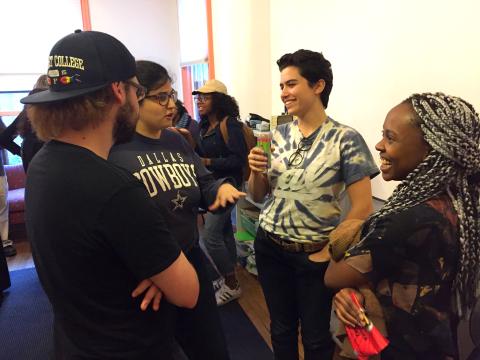
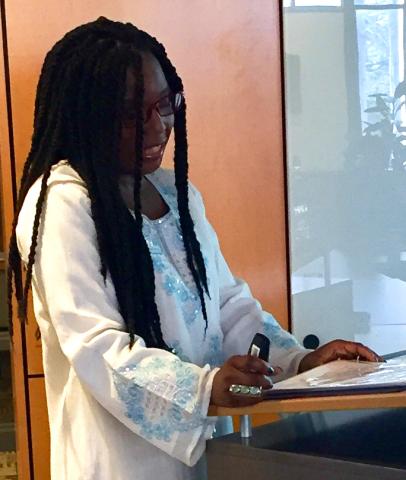
Nwando Achebe, an award-winning historian and professor of history at Michigan State University, visited Amherst College and gave a talk titled, “University of Benin F**k Porn: Lesbian Sex, Internet Voyeurism, and ‘Corrective Rape’ at a Nigerian University.”
On July 3, 2011, University of Benin, Nigeria, female students recorded themselves performing a strip tease. A few hours later, their video clip had gone viral. Achebe’s talk explored the events of July 3, as a lens through which to view the perpetuation of hate crimes and violence against lesbian women by Nigerian men. It considered the attitudes of an anonymous spectator audience, and called into question the role of the Internet in providing, on one hand, a safe haven for sexual minorities; but on the other, easy access for unscrupulous men to exercise violent control over Nigerian women’s bodies.
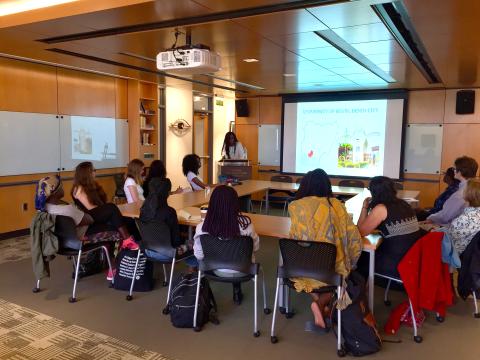
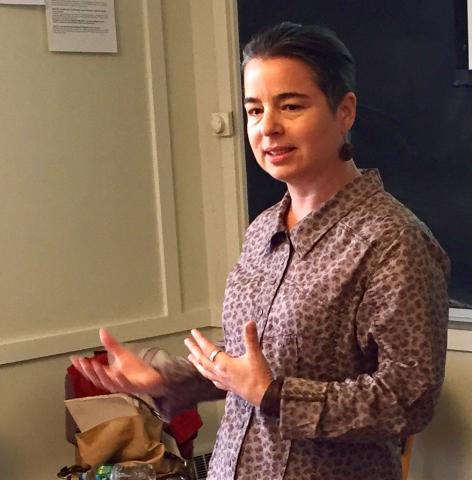
Pascha Bueno-Hansen, Associate Professor of Women and Gender Studies at the University of Delaware, gave a talk on “The Emerging LGBT Rights Challenge to Transitional Justice.” Bueno-Hansen has authored various articles and book chapters on issues including gender-based violence, sexuality, race, human rights, transitional justice, and social movements, with a Latin American regional focus.

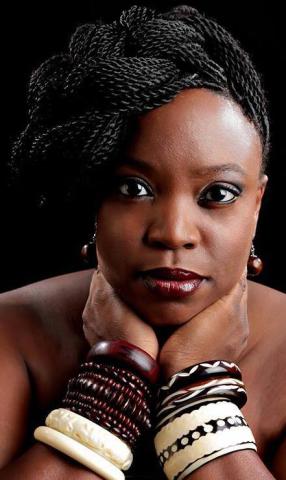
Madia Cooper, Liberian dance educator, West African and Social Dance Performing artist, choreographer, and scholar, was a guest speaker in Professor Aneeka Henderson’s SWAG 329 Bad Black Women class (Spring 2017). Cooper also taught a master dance class with instruction and choreography that included traditional West African vocabulary, Afro-Modern, and West African Hip Hop. Cooper is currently a Visiting Professor of Dance at Brenau University.
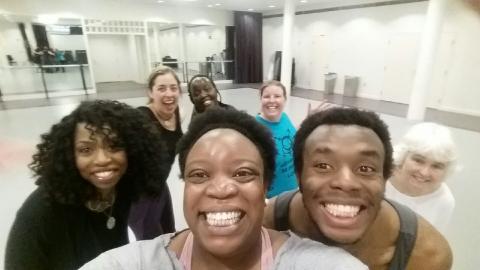
Professor Amrita Basu organized two workshops and a symposium on March 7th-8th on Feminist Movements in a Reactionary Era. The event was co-sponsored by the Five College Women’s Studies Research Center. It began with two faculty workshops on March 7th. The first, on Authoritarianism, Religion, and the State, asked how women’s movements have responded to the growth of conservative religious parties and movements. What kinds of fissures have emerged between secular and religious women activists and how should we assess feminist debates on secularism in an era of growing Islamophobia? Following dinner, a second session addressed the implications of the growth of neoliberalism for feminism and for women from poor, indigenous communities, ethnic, sexual and religious minorities.
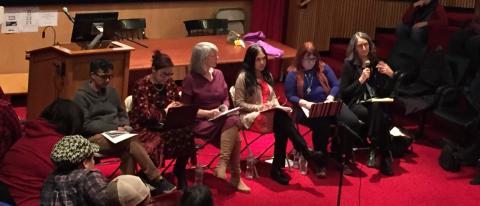
The following day, International Women’s Day, there was teach-in, talk around and walk out. The panelists, a mix of international and local scholars, were asked to address a common set of questions that centered on the challenges that feminist movements have faced amidst the growth of right wing parties, movements and regimes. State repression, militarization, neo-liberal policies and religious conservatism threaten many of the gains women, racial and religious minorities and LGBT groups have made. While women have been the worst targets of these reactionary trends, they have also been at the forefront of progressive movements. What lessons can we learn from women’s movements cross-nationally about the possibilities of organizing across multiple lines of difference? After the discussion, several film clips were shown on a women’s strike that took place that day in many different regions of the world.
Then panelists and audience members picked up posters that some of the organizers had made and marched through the Amherst town commons to demonstrate their solidarity and support for transnational feminist goals.
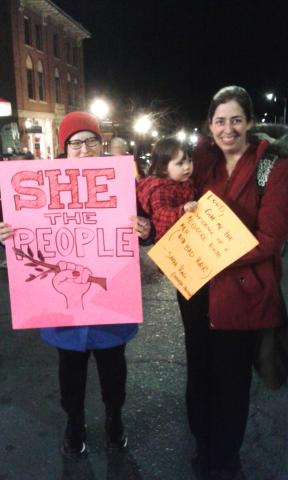
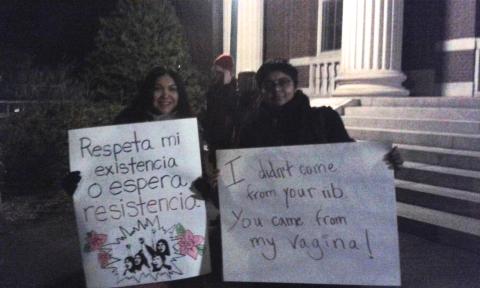
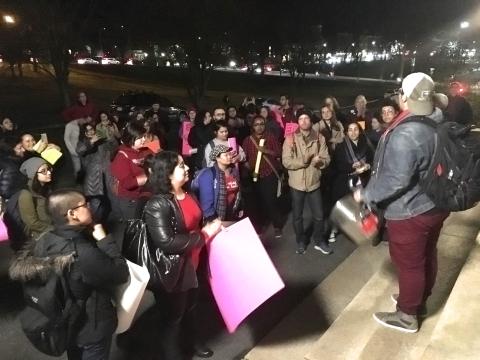
The Sexuality, Women’s and Gender Studies Department also held several film screenings throughout the year.
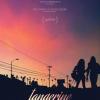
Tangerine (2015) is the story of a transgender sex worker who, after hearing that her boyfriend/pimp cheated on her while she was in jail, sets out with her best friend to find her ex and teach him and his new lover a lesson.
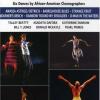
American Dance Festival’s Dancing in the Light features six historic works by African American choreographers, filmed by ADF to preserve and celebrate the black tradition in modern dance. When the dances are viewed together in chronological order, they dramatically underscore, as host Taye Diggs puts it, “the important role black choreographers have played in the development of American modern dance.”
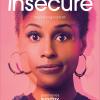
Season 1 of HBO’s hit series Insecure, an original comedy based partially on Issa Rae’s widely lauded web series Awkward Black Girl.
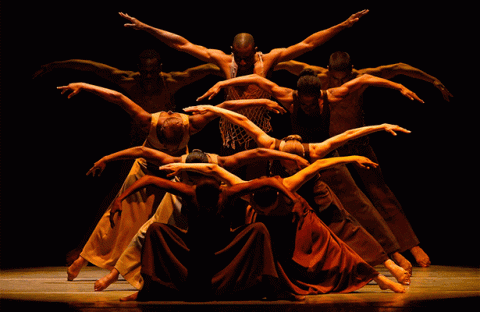
In April 2017, Professor Henderson took a group of students, including her SWAG 329 Bad Black Women class, to see the Alvin Ailey American Dance Theater Performance at UMass Amherst.
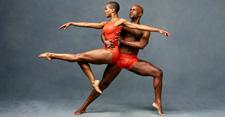
Professor Aneeka Henderson’s Bad Black Women students honored her by inviting her to a Take-Your-Professor-Out dinner at Johnny’s Restaurant in Amherst.
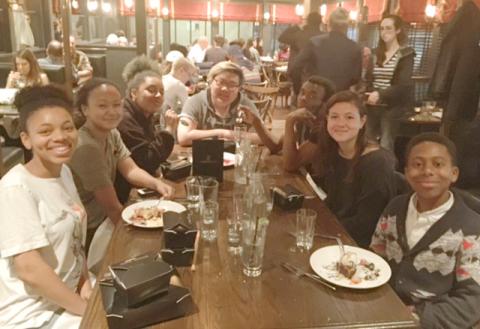
Every year the Queer Resource Center (QRC) reflects on the areas in which we have improved or advanced the resources and services we offer. Most importantly for our continued growth to be possible, we reflect on areas for improvement. With the myriad of changing communities that we serve, the QRC has always strived to bring visibility or recenter those who are often pushed to the margins. We have been working over the years to address areas of inequity on campus as it relates to trans and nonbinary identities, resources, and services. However, in response to an increase in national and campus climate issues last year, the QRC strengthened our efforts to serve and support our transgender and nonbinary communities. Working with trans and nonbinary community members and campus partners to think strategically and critically about areas for improvement, we were able to identify clear actions and next steps to address overall concerns.
The QRC has helped drive many of the initiatives and will continue to work with campus partners to foster our commitment as an institution to meet the needs of our trans and nonbinary communities.
Some highlights include…
These initiatives are not possible without our community working together. We as an institution should be proud of the changes we have made and the impact it has and will have on our campus and on other campuses across the country. So many campus partners have dedicated their time and resources and we are incredibly grateful for their commitment to creating a trans and nonbinary inclusive campus. And, we know this work is not done. As a community and in the QRC we must hold each other accountable to our commitment to ensure that trans and nonbinary people can thrive and live as their true, authentic selves at Amherst.
In solidarity, Queer Resource Center
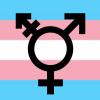
On January 20, 2017, 21 members of the Reproductive Justice Alliance boarded two passenger vans and embarked on a trip to the Women’s March on Washington. The Reproductive Justice Alliance is one of two new feminist student organizations emerged during this academic year. The group formed following the 2016 election by Samantha O’Brien (’18) and Kamini Ramlakhan (‘17), both SWAGS majors who also work at the Women’s and Gender Center (WGC).
Fueled by concerns that the new administration would work to erode access to reproductive health care, the Reproductive Justice Alliance organized the trip to the Women’s March as their first major program. But, their focus was not only on reproductive health. This student organization provides an intersectional framework to their understanding of reproductive justice and concerns about how gender intersects with race, class, environmental justice, queer and trans rights, immigration, and disability, were integral to their understanding of why being present at this event was of vital importance.
Many of the students who attended stated that they signed up to go because they wanted something tangible that they could do following the election as an outlet for their fear, anger, and frustration. Others said that they wanted to show up and be counted. For some, this was their first protest and they seized the opportunity to be politically engaged in this way. Some had attended many protests and were seasoned protestors.
Although the experience of being in DC for this historic moment was incredibly powerful, the march itself was not without complications. From conflicting understandings of feminism, to the critiques from feminists of color, to the disparities between the goals of organizers their white, “pink pussy hat” clad, middle-class base, to challenges with permits and location, to the sheer volume of attendees and the inevitable logistical and communications challenges—this was a complicated event to attend for many.
For some, it felt lonely because in a sea of women, they didn’t see themselves reflected back in the crowd. Others were disappointed by the choices of some to chant over notable women of color speakers, like Angela Davis, because they were tired of listening to speakers and ready to march. Some were impacted by the fact that most of the women of color speakers were slated to speak toward the end of the program at which time the crowd had grown restless. All were tired from standing pressed up against other humans for hours and hungry because it was seemingly impossible to make it through the crowd to find a food vender and certainly impossible to find the group again if you tried.
The beauty of this trip was that by traveling in a large delegation with the Directors of the MRC and WGC, the group was able to debrief these complications at the end of each day and dialogue about different experiences. The racial diversity of the group, as well as the varied sexual identities, religious affiliations, and class backgrounds deepened conversations. Sitting around a large table in the manse of the Unitarian Universalist Church that had gifted us a place to stay, the group engaged questions like:
Each person was given time and space to talk and all participants listened deeply and showed support and solidarity for one another. What was missing from the march was made possible within this close-knit community of Amherst College women. Community. Listening. Bearing witness. Loving. Learning.
Overall, the group was very glad to have attended and there were some amazing moments at the march. When in your life do you get to hear your feminist heroes all speak at the same event? Gloria Steinem, Carmen Perez, Janet Mock, Melissa Harris-Perry and so many more brilliant women took the stage. How often does Alicia Keys perform with the Indigo Girls, Madonna, Janelle Monae, and Toshi Reagon? The women of the Reproductive Justice Alliance laughed and bonded and danced and huddled together to stay warm, sharing snacks and stories, making friendships. The trip was inspiring. And, it was complicated.
The Women’s March didn’t provide us a roadmap to collective liberation. But, it left us with the right questions to ask and answer together that will someday get us there. Building a broad-based coalition is hard work and there is vested interest in keeping us divided across lines of difference. As Audre Lorde said: “In our world, divide and conquer must become define and empower.” The Reproductive Justice Alliance and the Women’s and Gender Center will continue to interrogate these questions in the goal of empowering students to become change agents, increasing solidarity and lessening divisions on our campus and in our country.
Since returning from DC, the Reproductive Justice Alliance has hosted a number of events, including a meet-and-greet with high school students interested in feminism, several club meetings, two debriefs of the March, and a 5K benefiting the Prison Birth Project. They have also attended the Civil Liberties and Public Policy conference and have been raising money for reproductive justice causes that they believe in. With Women’s Group, the other feminist student organization that was created this year, Reproductive Justice Alliance is deepening conversations on feminism, gender equity, and intersectional organizing. This is just the beginning.
By Jesse Beal, Director of the WGC
Jay Fields is a SWAGS triple major who graduated spring 2017. Their other majors are Black Studies and Art and the History of Art. Their focus on identity studies informs their art practice, and the fluidity of their art informs their approach to identity studies. In all three of their majors, they have pursued classes and projects that center the study of how identities are formed and destabilized. Balancing between the academic study of identity and personal experience with identity Jay aims to create art that reflects the struggle between identity as an empowering and entrapping experience. Jay plans to pursue their studies next year at Union Theological Seminary, the Divinity School of Columbia in New York, adding religion to the collection of identities that have been their focus at Amherst.
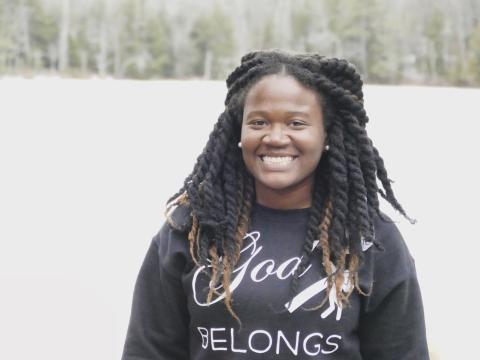
JoDeanne Francis is a graduating senior who majored in SWAGS and Psychology. She wrote a senior SWAGS thesis entitled “Is Jesus a Feminist? Feminist and Womanist Theologians Answer to the Question of Reconciliation.” Within her thesis, she asked and answered the question about the reconcilability of an individual’s feminist and Christian identity. The journey of her thesis started in her junior year when she was approved for an independent study which entitled, “Faith and Feminism” and continued to grow throughout her junior summer after being approved for a grant from the Gregory S. Call Undergraduate Research Program. Though she has finished this work, she believes it will be a topic she continues to strive to answer throughout her life. JoDeanne is excited to spend the next three years doing Campus Ministry in the Pioneer Valley.
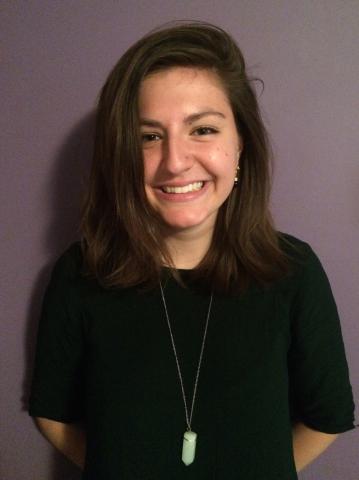
Outside of the classroom, Samantha has been an employee at the Amherst College Women’s and Gender Center for over two years. Starting in the fall, Samantha will be transitioning from her role as the Office Coordinator to her role as an Education Coordinator, which means that she will be responsible for planning curriculum, holding educational programs, as well as generating education materials for the student body. She is excited about this transition because, she believes, that it is the perfect way for her to put her academic knowledge of sexuality, women’s and gender studies into practice. One of her main takeaways from being a SWAGS major has always been that esoteric feminism is virtually useless if it isn’t expanded beyond an academic setting, if it isn’t made accessible to larger populations. Seeing as SWAGS majors are, by and large, a self-selecting audience of individuals with a general interest in feminism, as an education coordinator, she hopes to expand her knowledge of feminist theory beyond this circle.
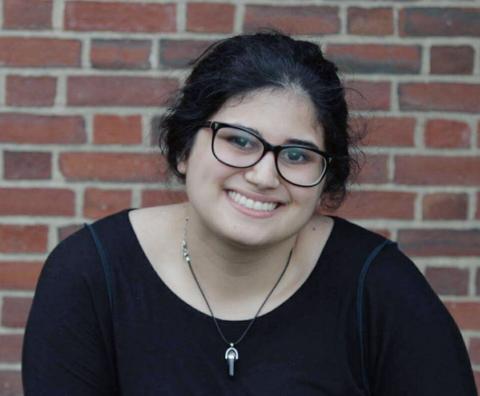
When Andrea first joined the Amherst community, she was certain she was going to become a Psychology major and while she still has hopes that she will eventually gather the effort needed to sign a major declaration form, it was the SWAGS department that immediately caught her love. As a child, Andrea always considered herself to be a feminist, but it was not until she took SWAGS 100 (Construction of Gender) that she realized how lacking her brand of feminism was. Overtime, she has learned about the importance intersectionality of different identities (race, gender, sexuality) when it comes to discussing and learning about feminist issues. Andrea is incredibly grateful to the SWAGS department, professors, and her peers for helping her to become--what she believes--to be a better human being.
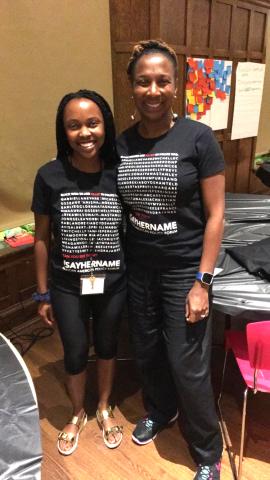
Last summer, SWAGs and Black Studies major Lerato Teffo worked with her idol, Kimberle Crenshaw, at The African American Policy Forum. She first discovered Crenshaw’s scholarship in an Amherst College course title, Black Women’s Narratives, taught by Professor Aneeka Henderson. Lerato asserts that the class inspired her to declare in SWAGS and focus her academics on women of color. It was during this time she knew she needed to meet Crenshaw and work with her think tank to continue the conversation about State violence against Black women and girls. This summer Lerato will be interning at THINX, a feminine hygiene startup known for its menstruation underwear and provocative advertisements. She hopes to work with the team and its partnership with AFRIpads in Uganda to continue educating people about menstruation and providing affordable and reusable feminine hygiene products.
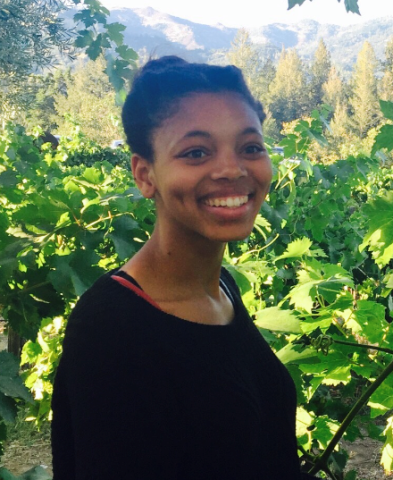
Kennedy Reed is a SWAGS and Mathematics double major from the Bay Area, California. She chose to become a SWAGS major because she enjoys intellectual and creative studies relating to her identities. Kennedy participates in the Black Student Union and appreciates her ability to use her growing knowledge from her SWAGS courses to support other black women on campus and beyond. She looks forward to exploring intersections of sexuality, women’s and gender studies and math through personal research, as well as with other STEM/humanities students and professors.
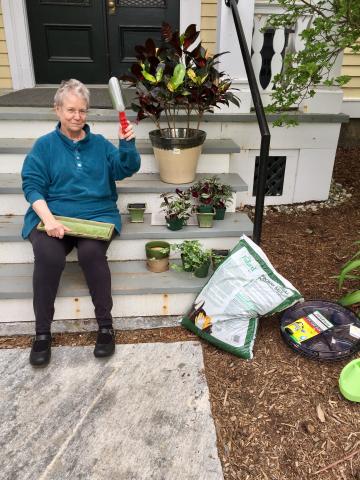
The redecorating of the SWAGS conference room in Grosvenor House continues with the addition of several new plants. Professor Michele Barale and Stephanie Orion put their gardening skills to work and repotted a croton, a hedera ivy, and a purple wandering jew. All are helping to breathe new life into the SWAGS conference room.

Congratulations to Margaret Banks and Ayoung Kim, the 2017 winners of the Rose Olver Prize!
This prize is awarded annually to the thesis that best analyzes the construction of gender in conjunction with the historical, political, social, cultural, or psychological experiences of subjects. The thesis should also address gender relations as they intersect with class, race, sexuality, or nationality. Finally, the thesis should consider the broader implications of its conclusions for the field of sexuality, women’s, and gender studies.
More information about this prize is available on our website.
Please join us in congratulating our seniors who completed their SWAGS comprehensive requirement. A hearty cheers goes out to: Saren Deardorff (SWAGS/Black Studies), Jay Fields (SWAGS/Art & the History of Art/Black Studies), Rosemary Gonzalez (SWAGS), and Kamini Ramlakhan (SWAGS/Psychology).
Another congratulations goes out to JoDeanne Francis (SWAGS/Psychology) for completing her SWAGS thesis “Is Jesus a Feminist? Feminist and Womanist Theologians’ Answer to the Question of Reconcilliation.” (Faculty Advisor: Michele Barale).
SWAGS/WAGS alumni! We want to hear from you! Please send us updates on your personal or professional lives that we can include in next year’s newsletter. Submissions can be emailed to the Sexuality, Women’s and Gender Studies Department or mailed to us at the address on the bottom of our homepage.